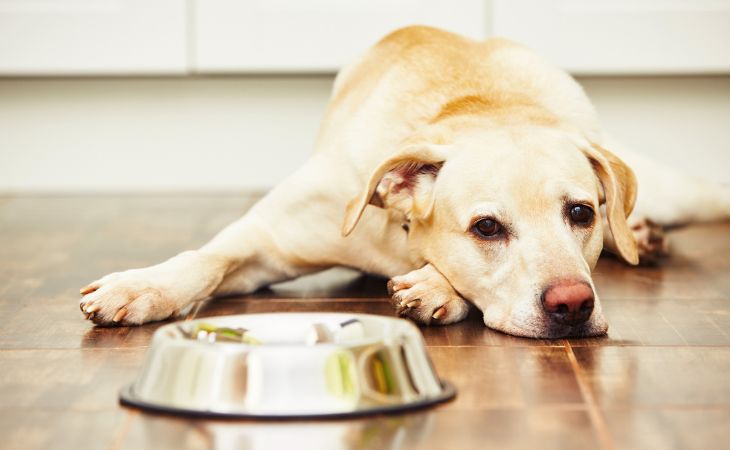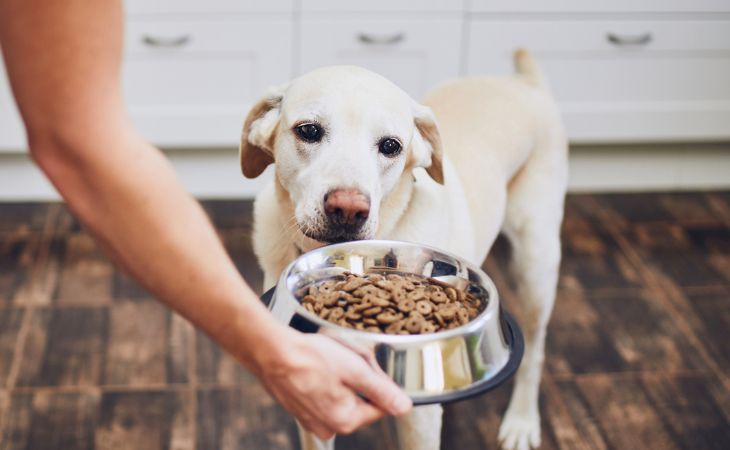A dog can lose their appetite for multiple reasons. Some reasons are benign and temporary, while others can indicate a serious health issue. For this reason, it is important to act quickly to help your dog find their appetite again. In this article, Letsgetpet will provide you with tips to help you accomplish this.
My dog lost their appetite: what are the causes?
The loss of appetite in dogs can be a symptom of various dental conditions that make chewing painful. It can be an infection, cavity, abscess, or pain linked to malocclusion. In addition, gastrointestinal issues like inflammations of the stomach or intestines can cause nausea, abdominal pain, or vomiting. All of this can cause a loss of appetite in dogs.
Systemic diseases such as infection, diabetes, and endocrine disorders can also lead to a loss of appetite. It can be a kidney, liver, or heart disease. Some medications or medical treatments such as chemotherapy, antibiotics and analgesics can have the side effect of reducing a dog’s appetite.
Dogs can lose the desire to eat due to environmental factors. It can be from moving house, changing their routine, introducing a new pet to the family, or the loss of a family member.
A physical trauma, wounds, chronic pain, or a recent surgery can lead to the loss of appetite in dogs. Furthermore, psychological issues such as anxiety, depression, or stress can influence the appetite of pets.
An unbalanced diet can also cause a dog to not want to eat. In addition to this, a sudden transition to a different food or a disinterest in the food that is given to them can also lead to a loss of appetite.
A few tips to stimulate your dog’s appetite
There are simple strategies that you can use if your furry friend refuses to eat their food without an apparent reason.
Set good eating habits
To stimulate the appetite of your dog, make your dog’s mealtime enjoyable. You can use interactive toys or puzzle feeders. These products force your furry friend to work to obtain their food.
You can also create a regular feeding routine. Try to feed your dog at fixed times, preferably two times per day to ensure a regular eating pattern.
In addition to this, create a calm and peaceful environment during their meals. Keep them away from loud noises, other animals, or any other distractions that can keep them from concentrating on their meal.
If your dog gets distracted before finishing their meal, fill their bowl and leave it alone. Then, come back half an hour later and take the bowl away, whether or not they ate from the bowl or not. They will quickly understand that they need to take advantage of the opportunity to feed themselves when it is present.
Serve them food according to their preferences
Some dogs prefer eating smaller portions more frequently throughout the day. If your pet has a hard time finishing their meals, give them smaller portions more times throughout the day.
To stimulate their appetite, you can mix canned food or lean cooked meat with their dry food. This allows you to improve the taste and odor of the meal. Ensure, nevertheless, that the additional food that you add is not dangerous for dogs.
This article might interest you: Can I give my dog my table scraps?
Some pets can be more attracted to food with different textures. You can try to propose to your dog wet food, semi-wet food, or even slightly frozen food to see if they prefer any of these textures.
Sometimes, dogs can be more demanding about their food. Don’t rush to change brands or types of food immediately. Continue to give them the same high quality food and let your pet take the time to get used to their meal routine. If you need to change their ration, mix progressively the previous food with the new one for one week. You can then increase the proportion of the new food little by little. This will help your dog adapt themselves and digest more easily the change of food.
Regularly exercise with your dog
Regular physical activity will stimulate their appetite. You can take them on a walk for an hour before giving them their meal. Thus, they will associate walks with mealtime, which will reinforce the positive connection between these two activities.
Ideally, your dog needs to do physical exercise every day or at least several times a week. However, their needs can vary depending on the breed and age of the dog.

Special foods and nutritional supplements for a dog with a poor appetite
There are many options for special food and nutritional supplements that can be used to stimulate the appetite of dogs. They are notably:
- wet food,
- appetite supplements,
- nutritional supplements.
Wet foods often have an odor and texture that is more attractive for dogs. They can be used to stimulate appetite and bring variety to your dog’s meals.
Some manufacturers also propose specially formulated foods for dogs that have a problem with their appetite. These foods are designed to be particularly delicious and stimulate the desire to eat.
There are many well-known brands that make appetizing foods for dogs that you can choose from. They propose a large range of adapted food for different nutritional needs and preferences.
There are also dietary supplements for dogs that are specially formulated to stimulate a dog’s appetite. They often contain ingredients such as amino acids, vitamin B, and plant extracts that can help create the desire to eat.
If your dog does not eat enough, nutritional supplements can be used to ensure that they receive essential nutrients. This can include supplements rich in calories, protein, omega-3 fatty acids, vitamins and minerals.
The use of special foods and nutritional supplements is only a temporary measure to stimulate the appetite of your dog. It is essential to identify the main cause of the loss of appetite of your dog and treat the problem well.
Consult a vet if your dog has lost their appetite
If your dog has a persistent loss of appetite, it is important to consult a vet. They can determine the underlying cause and elaborate an appropriate plan.
To start off with, the vet needs to perform a complete examination of your dog to detect any signs of disease or health problems. This may include blood tests, urine tests and other complementary examinations to assess your four-legged friend’s general health.
As soon as the cause of the loss of appetite is identified, the vet can recommend a specific treatment. For example, if it is due to an infection, your dog may need antibiotics. If it is related to digestive issues, medication or a specific diet may be prescribed.
In some cases, the vet can recommend medication or supplements to stimulate the appetite of your dog. If they do not eat enough, they can recommend special foods or nutritional supplements. In other cases, tube feeding or intravenous nutrition may be required.
Your vet will plan follow-up consultations to evaluate the appetite of your dog and adjust the treatment if this is necessary. It is important to follow the recommendations of the specialist and communicate regularly with them to survey the progress of your dog.

